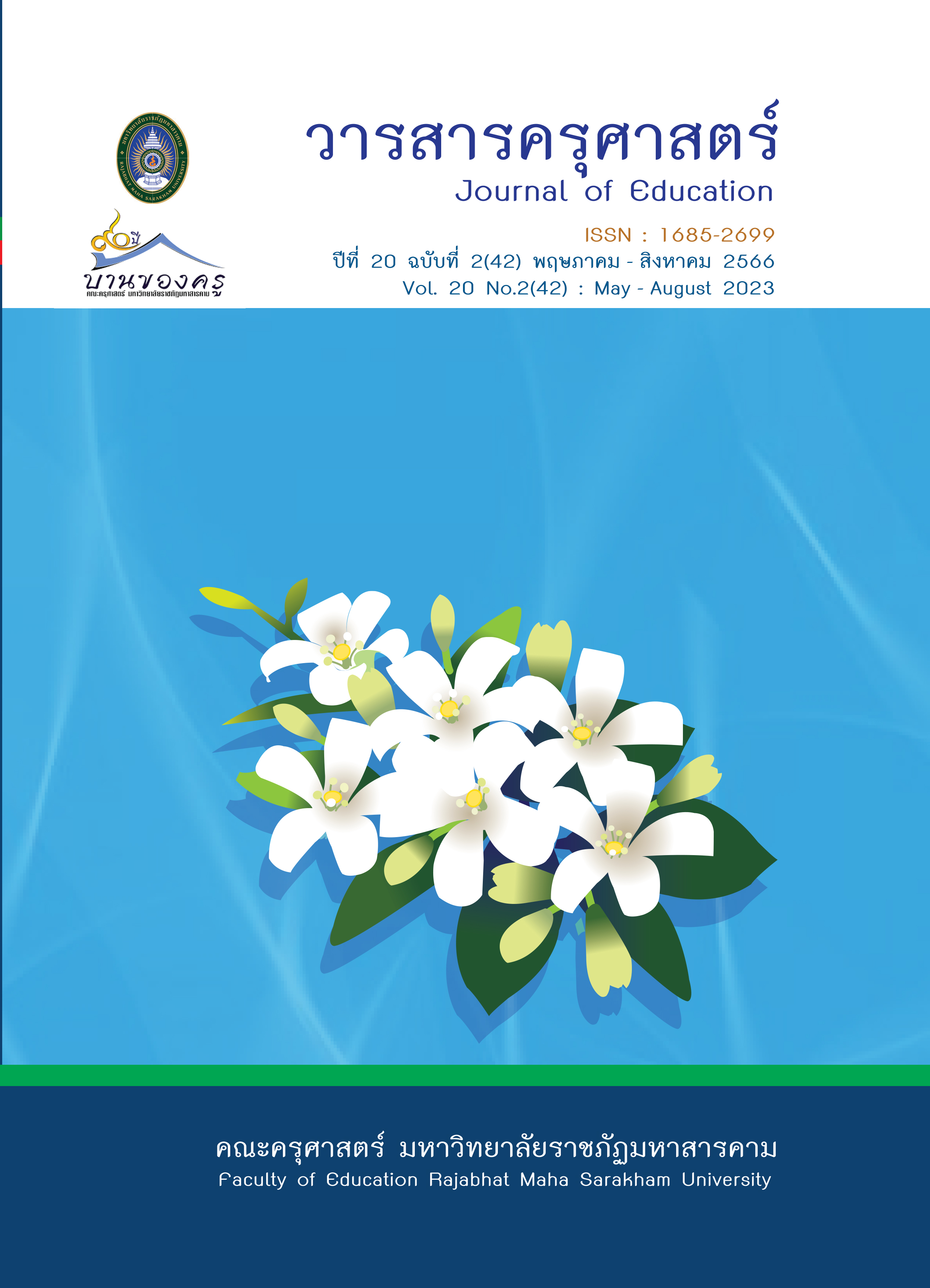การพัฒนาทักษะทางสังคมและความสามารถการกำกับตนเองของนักเรียนชั้นประถมศึกษาปีที่ 6 ตามแนวคิดทฤษฎีแบนดูรา, เมตาคอกนิชัน, การให้เหตุผล และการเรียนรู้แบบกลุ่มร่วมมือ
Main Article Content
บทคัดย่อ
การวิจัยครั้งนี้มีวัตถุประสงค์เพื่อ 1) เปรียบเทียบทักษะทางสังคมและความสามารถการกำกับตนเองของนักเรียน ก่อนเรียนและหลังเรียน ด้วยการจัดการเรียนรู้ตามแนวคิดทฤษฎีแบนดูรา,เมตตาคอกนิชัน, การให้เหตุผล และการเรียนรู้แบบกลุ่มร่วมมือ และ 2) เปรียบเทียบทักษะทางสังคมและความสามารถการกำกับตนเอง ของนักเรียนกลุ่มทดลองที่จัดการเรียนรู้ตามแนวคิดทฤษฎีแบนดูรา, เมตตาคอกนิชัน, การให้เหตุผล และการเรียนรู้แบบกลุ่มร่วมมือกับกลุ่มควบคุมที่จัดการเรียนรู้แบบปกติ การวิจัยครั้งนี้ใช้วิธีการวิจัยเชิงทดลอง (Experimental research) ด้วยการสุ่มเพื่อกำหนดกลุ่มทดลองและกลุ่มควบคุม (Random assignment) กับนักเรียนชั้นประถมศึกษาปีที่ 6 โรงเรียนสุนทรวิจิตร (บำรุงวิทยา) อำเภอเมืองนครพนม จังหวัดนครพนม ห้อง 6/2 และห้อง 6/3 จำนวน 29 คน และจำนวน 28 คน ตามลำดับ ในภาคเรียนที่ 2 ปีการศึกษา 2564 เครื่องมือที่ใช้จัดเก็บข้อมูล ได้แก่ แผนการจัดการเรียนรู้สำหรับจัดการเรียนรู้กับกลุ่มทดลอง จำนวน 24 แผน แบบประเมินทักษะทางสังคมของนักเรียน จำนวน 40 ข้อ และแบบประเมินความสามารถการกำกับตนเองของนักเรียน จำนวน 20 ข้อ สถิติที่ใช้ในการวิเคราะห์ข้อมูล ได้แก่ ค่าเฉลี่ย ส่วนเบี่ยงเบนมาตรฐาน ร้อยละ และทดสอบสมมติฐานด้วย t-test (Dependent Sample) และ F-test (One way MANOVA)
ผลการวิจัย พบว่า 1) นักเรียนกลุ่มทดลองที่จัดการเรียนรู้ตามแนวคิดทฤษฎีแบนดูรา, เมตตาคอกนิชัน, การให้เหตุผล และการเรียนรู้แบบกลุ่มร่วมมือ มีทักษะทางสังคมและความสามารถการกำกับตนเองหลังเรียนสูงกว่าก่อนเรียน อย่างมีนัยสำคัญทางสถิติที่ระดับ .05 และ 2) นักเรียนกลุ่มทดลองที่จัดการเรียนรู้ตามแนวคิดทฤษฎีแบนดูรา, เมตตาคอกนิชัน, การให้เหตุผล และการเรียนรู้แบบกลุ่มร่วมมือ มีทักษะทางสังคมและความสามารถการกำกับตนเองหลังเรียน สูงกว่ากลุ่มควบคุมที่จัดการเรียนรู้แบบปกติ อย่างมีนัยสำคัญทางสถิติที่ระดับ .05
Article Details

อนุญาตภายใต้เงื่อนไข Creative Commons Attribution-NonCommercial-NoDerivatives 4.0 International License.
ข้อกำหนดเบื้องต้นที่ผู้นิพนธ์(ผู้ส่งบทความ) ควรทราบ
1. ผู้นิพนธ์ที่ประสงค์จะลงตีพิมพ์บทความกับวารสาร ตั้งแต่เดือนมกราคม 2563 เป็นต้นไป ให้ใช้รูปแบบใหม่ (Template 2563) โดยสามารถดูตัวอย่างได้ที่เมนู GUIDELINES
2. จะตีพิมพ์และเผยแพร่ได้ ต้องผ่านการประเมินจากผู้ทรงคุณวุฒิ (Peer Review)
3. การประเมินบทความโดยผู้ทรงคุณวุฒิ (Peer Review) เป็นแบบ Double Blind
4. การอ้างอิงบทความใช้หลักเกณฑ์ APA (American Psychological Association) คลิก
5. บทความถูกปฏิเสธการตีพิมพ์ ไม่ผ่านการประเมิน ผู้นิพนธ์ขอยกเลิกเองหรือชำระเงินก่อนได้รับการอนุมัติ ทางวารสารไม่มีนโยบายการคืนเงิน
เอกสารอ้างอิง
กระทรวงศึกษาธิการ. (2551). หลักสูตรแกนกลางการศึกษาขั้นพื้นฐานพุทธศักราช 2551. กระทรวงศึกษาธิการ.
สำนักวิชาการและมาตรฐานการศึกษา. (2553). แนวทางการจัดการเรียนรู้ตามหลักสูตรแกนกลางการศึกษาขั้นพื้นฐาน พุทธศักราช 2551. โรงพิมพ์ชุมนุมสหกรณ์การเกษตร แห่งประเทศไทย จำกัด.
Bandura, A. (1997). Self-efficacy: The exercise of control. W. H. Freeman & Company.
Broadhead, P., Johnston, J., Tobbell, C., & Woolley, R. (2010). Personal, Social and Emotional Development. (Supporting Development in the Early Years Foundation Stage). Continuum.
Buhl, J., Sumpter, D. J., Couzin, I. D., Hale, J. J., Despland, E., Miller, E. R., & Simpson, S. J. (2006). “From disorder to order in marching locusts,” Science. 312(5778): 1402–1406.
Charles, C.M. (2002). Building classroom discipline (7th ed.). Allyn and Bacon
Coon, D. & Mitterer, J. O. (2011). Psychology: A Journey (4th ed). Belmont, CA: Wadsworth, Cengage Learning.
D’Andrea, J. M., & Ivey, M. B. (2012). Theories of counseling and psychotherapy: A multicultural perspective. CA: Sage Publication.
Dignath, C. & Veenman, M.V.J. (2021). The Role of Direct Strategy Instruction and Indirect Activation of Self-Regulated Learning—Evidence from Classroom Observation Studies. Educ Psychol Rev 33, 489–533 (2021). https://doi.org/10.1007/s10648-020-09534-0.
Elliott, S. N. (1993). Social Skills Rating System. Circle Pines, MN: American Guidance Service.
Flavell, J.H. (1979). “Metacognition and Cognitive Monitoring: A New Area of Cognitive Developmental Inquiry,” American Psychologist.
Gredler, M. E. (1997). Learning and Instruction: Theory into Practice (3th ed). Merrill an imprint of Prentice Hall.
Gregory, G. H. & Kuzmich, L. (2005). Differentiated Literacy Strategies for Student Growth and Achievement in Grade 7-12. Thousand Oaks, CA: Corwin Press.
Gresham, F. M. (2006). Social skills training for teaching replacement behaviors: Remediating acquisition deficits in at-risk students. Behavioral Disorders, 31(4), 363-377.
Griffith, P. L., &Ruan, J. (2005). What is metacognition and what should be its role in literacy instruction? In S. E. Israel, C. C. Block, K. L. Bauserman, & K. Kinnucan-Welsch (Eds.), Metacognition in literacy learning. (pp. 3–18). Mahwah, NJ: Lawrence Erlbaum Associates, Inc.
Gudwin D. M., Salazar-Wallace M. D. (2010). Mentoring and coaching. Thousand Oaks, CA: Corwin. Google Scholar. Guyton E., Hidalgo F. (1995).
Johnson, D.W. and R.T. Johnson. (1990). Learning Together and Alone: Cooperative, Competitive and Individualistic Learning. 2nd ed. New Jersey: Prentice-Hall.
Johnson, D.W., & Johnson, R.T. (1994). Learning Together and Alone. Cooperative, Competitive, and Individualistic Learning. (4th ed.). Edina, Minn.: Interaction Book Company
Kamaruddin, S. and Yusoff, N. (2019) The Effectiveness of Cooperative Learning Model Jigsaw and Team Games Tournament (TGT) towards Social Skills. Creative Education, 10, 2529-2539. https://doi:10.4236/ce.2019.1012180.
Kassin, S. Steven, F. & Markus, H.R. (2011). Social Psychology (8th ed). Belmont, CA: Wadworth, Cengage Learning.
Kimmel, M. S. (2002). “Gender Symmetry” in Domestic Violence: A Substantive and Methodological Research Review. Violence Against Women, 8(11), 1332–1363. https://doi.org/10.1177/107780102237407.
Mandell, A., & Herman, L. (2009). Mentoring: When Learners Make the Learning. In J. Mezirow, E.W. Taylor, & Associates (Eds.). Transformative Learning in Practice: Insights from Community Workplace and Higher Education. San Francisco: Jossey-Bass. 78-88.
Matson, J. L., Rotatori, A. F., & Helsel, W. J. (1983). Development of a rating scale to measure social skills in children: The Matson Evaluation of Social Skills with Youngsters (MESSY). Behaviour Research and Therapy, 21(4), 335–340. https://doi.org/10.1016/0005-7967(83)90001-3
Pintrich, P.R. (2000). Understanding Self-Regulated Learning. San Francisco: Jossey-Bass Publisher.
Prasetyo, I., Suryono, Y., & Gupta, S. (2021). The 21st Century Life Skills-Based Education Implementation at the NonFormal Education Institution. Journal of Nonformal Education, 7(1), 1-7.
Reeve, J., Ryan, R., Deci, E. L., & Jang, H. (2008). Understanding and promoting autonomous self-regulation: A self-determination theory perspective, In D, H, Schunk & B, J, Zimmerman (Eds.), Motivation and Self-regulated learning: Theory, research, and applications. (223-224). Erlbaum.
Slavin, R. E. (1993). Cooperative learning: Theory, research, and practice. Englewood Clilffs, NJ: Prentice Hall.
Zimmerman, B.J. (2000). ‘Attainment of self-regulation: A social cognitive perspective’, in Boekaerts, M., Pintrich P.R. and Zeidner, M. (eds.), Handbook of Self-regulation. San Diego, CA: Academic Press, 13–39.
Zimmerman, Barry J. (2011). “Motivational Sources and Outcomes of Self-Regulated Learning and Performance.” in Handbook of Self-Regulation of Learning and Performance. Barry J. Zimmerman and Dale H. Schunk (Eds.), Routledge, 49-64.


